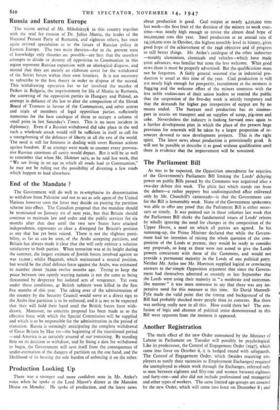The Parliament. Bill
As was to be expected, the Opposition amendment for rejection of the Government's Parliament Bill limiting the Lords' delaying power on public Bills passed by the Commons was negatived after a two-day debate this week. The plain fact which stands out from the debate—a rather peppery but undistinguished affair enlivened only by Mr. Churchill's cannonade—is that the Government case for the Bill is lamentably weak. None of the Government spokesmen was able to offer any proof that the Parliament Bill is either neces- sary or timely. It was pointed out in these columns last week that the Parliament Bill shirks the fundamental issues of Lords' reform by wholly ignoring the need for changes in the composition of the Upper House, a need on which all parties are agreed. In his summing-up, the Prime Minister declared that while the Govern- ment had no intention of raising the whole question of the com- position of the Lords at present, they would be ready to consider any proposals, so long as these were not armed to give the Lords powers concurrent with those of the Commons, and would not provide a permanent majority in the Lords of one political party. Neither Mr. Attlee nor Mr. Morrison supplied logical or convincing answers to the• simple Opposition argument that since the Govern- ment had themselves admitted as recently as last September that the Lords were using their majority in "a moderate and'statesman- like manner " it was mere nonsense to say that there was any im- perative need for this measure at this time. Sir David Maxwell- Fyfe made the valid point that the timing and background of the Bill had probably shocked more people than its contents. But there was nothing really new in all this. How could there be? The con- fusion of logic and absence of political sense demonstrated in this Bill were apparent from the moment it appeared.






























 Previous page
Previous page